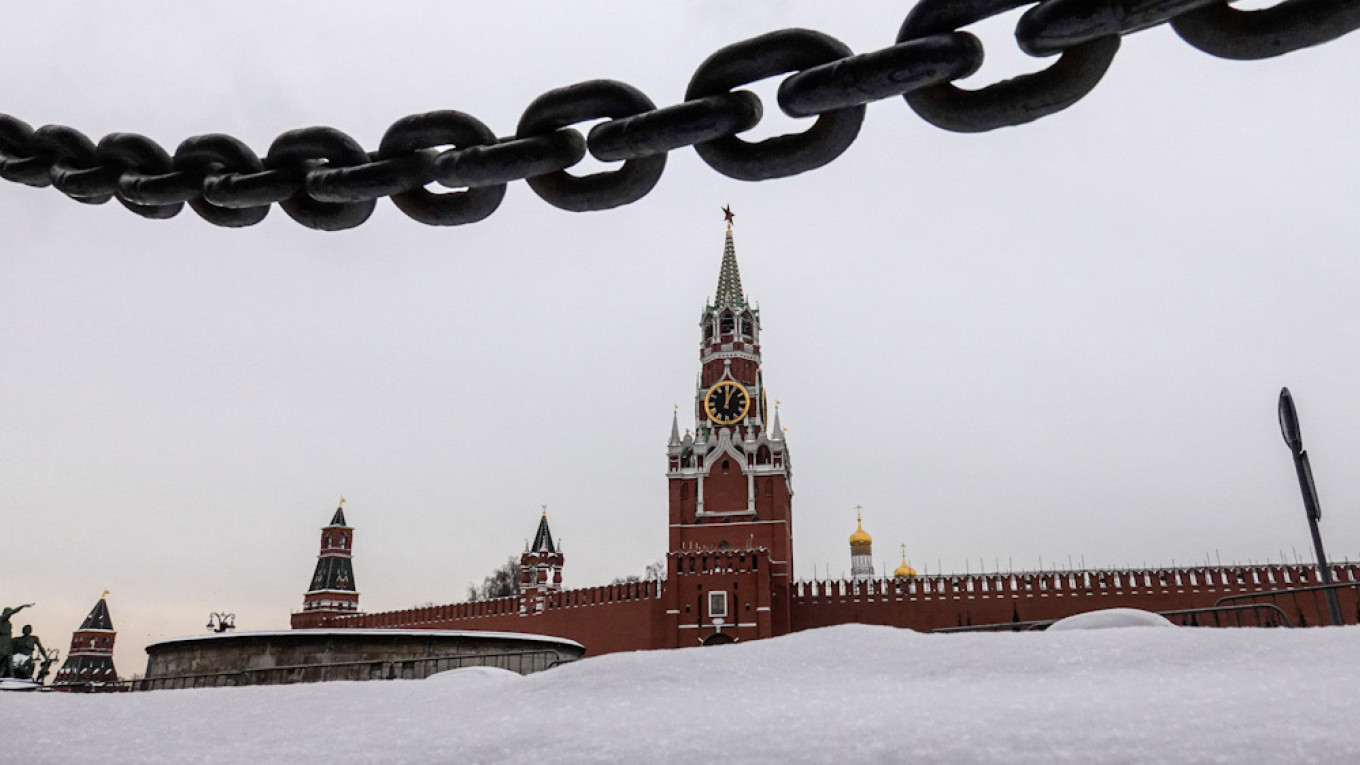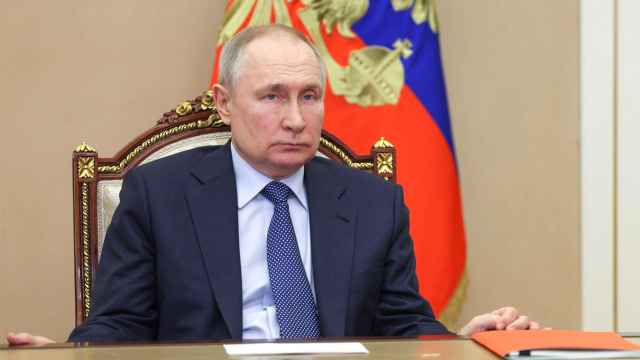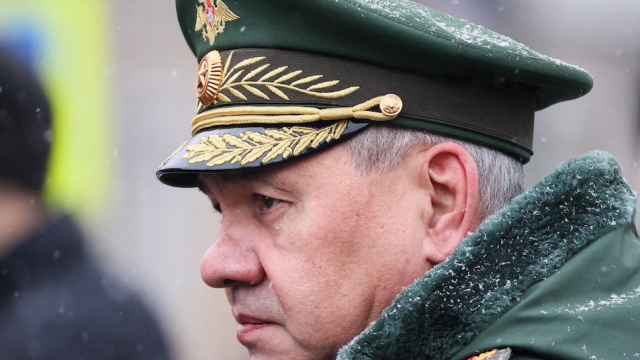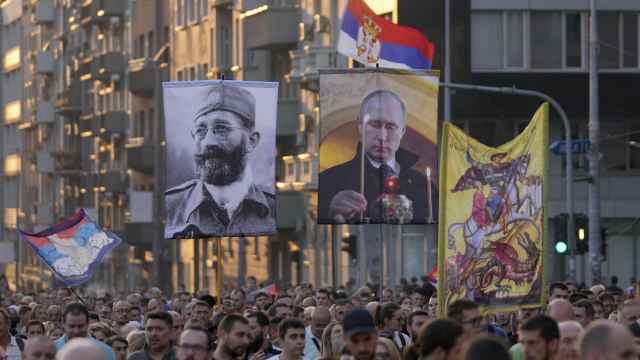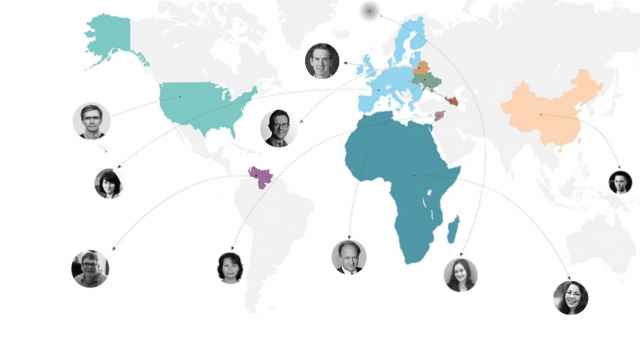In 2004, when the administration of former U.S. President George W. Bush was deciding how to respond to the situational alliance that France, Germany and Russia had formed on the UN Security Council in opposition to the U.S. invasion of Iraq, U.S. National Security Advisor Condoleezza Rice put it succinctly: “Forgive Russia, ignore Germany and punish France.” She was referring to the fact that former French President Jacques Chirac had organized the anti-U.S. coalition.
Now, Moscow — facing a crisis over the poisoning and arrest of opposition leader Alexei Navalny — has settled on a strategy for future relations with the collective West that can be summed up as follows: “Forgive the United States, ignore France and punish Germany — via the European Union.”
This strategy is an attempt to avert what would essentially become a ménage a trois, a situation in which Navalny would be invisibly present whenever President Vladimir Putin met or spoke with Western leaders.
In fact, all senior level Russian officials can now expect their Western counterparts to demand, with varying degrees of insistence, Navalny’s release at every mutual encounter. This is because the Group of Seven foreign ministers have issued an unprecedented joint statement calling for Navalny’s immediate and unconditional release and an investigation into his poisoning with chemical weapons. The Russian Foreign Ministry’s nervous reaction to the statement speaks for itself.
This is hardly a new challenge for Russian foreign policy, however. From 2003 until 2013, Moscow successfully fended off Western pressure over the arrest of former Yukos CEO and Putin political rival Mikhail Khodorkovsky by stepping up its anti-Western offensive.
Navalny’s arrest and earlier poisoning by what the OPCW conclusively proved were chemical warfare agents create an awkward political situation for Western leaders.
They cannot have any dealings with senior Russian officials without also demanding the release of the Russian opposition leader. This is especially true of Germany, to which Navalny was airlifted and where he received medical treatment as a personal guest of Chancellor Angela Merkel — who also personally published the data showing that chemical agents that had been used in his poisoning.
Thus, Russian diplomacy now has the task of making the Navalny case seem as routine as possible. Although domestic political considerations compel Russia’s Western partners to raise the issue, the Kremlin can quickly dismiss it, allowing the two sides to move on to discussing the topics on their bilateral agenda that really interest them.
No doubt Russian leaders would prefer to avoid the topic of Navalny altogether, but that is hardly possible. The main thing is to avoid letting the West use the Navalny issue as a means for prying into and meddling with Russia’s domestic affairs and politics.
Russia’s restrained squabbling with the West over Navalny is actually a boon for the Kremlin. Domestically, it reinforces official propaganda about hostile interference from abroad, incursions on Russia’s sovereignty and the activity of foreign agents. On the foreign policy front, it frees the Kremlin from having to stage what the West calls “malicious actions” with the goal of provoking retaliatory anti-Russian actions that would consolidate Russian society around the flag of the ruling regime.
Although some Western analysts fear that Western pressure over Navalny could provoke Russia to pursue a more provocative foreign policy, the opposite is more likely true: Moscow will now act with greater restraint to avoid more outside pressure than it needs for its own purposes.
And, contrary to some recent predictions, Moscow will not feign offense and go into self-isolation, give up on dialogue and cooperation with the West or withdraw from institutions and systems that serve U.S. and EU interests.
For the Kremlin, simply maintaining or even expanding cooperation with the West at senior levels of government and creating new platforms for high profile, status-rich dialogue — such as the proposed P5 summit of UN Security Council members — in itself helps ensure the legitimacy of the Russian government, generates domestic support and enables leaders to channel that support as necessary.
Moscow faces the urgent foreign policy task of creating a multi-pronged approach to key Western players in order to prevent them from forming a united front concerning the Navalny case. Hence, “Forgive the U.S., ignore France and punish Germany/the EU.”
The U.S.
With the U.S., Moscow has opted to restore systematic, high-level diplomatic relations and high profile formats of interaction, including a mechanism for the two presidents to meet on a regular basis.
That type of dialogue — first curtailed by former U.S. President Barack Obama and not restored by former U.S. President Donald Trump — is now seen as inherently worthwhile. For Russia, such a dialogue does not have to bear fruit: it simply has to exist. Beyond helping to overcome this or that crisis, it boosts Russia’s status as a major global power and lends external legitimacy to the Russian government in the eyes of its people. It counters the global perception of Russia as a rogue or spoiler state, an image that hurts the Kremlin’s standing domestically.
As noted by historian Sergei Radchenko, the situation is reminiscent of the Soviet Union’s attempts to gain external legitimacy and recognition of the country’s equal status. Moscow sought to improve relations with the U.S. and Europe first with the détente summits of the 1970s, and then in the early 1980s, when the Soviet leadership found itself isolated after the invasion of Afghanistan.
The Biden administration, despite its harsh rhetoric and promises to make Russia pay a high price for everything, as well as its demands for Navalny’s immediate and unconditional release, has not taken any concrete actions against Russia. As for sanctions, it is “re-evaluating” and promises to take a “strategic approach” with meaningful goals.
This creates an opportunity for the Kremlin to ignore the“aggressive rhetoric, “forgive the U.S.” and start things off with a clean slate.
France
Ignoring France is a simple strategy that requires of Moscow little more than exercising restraint in how it assesses French President Emmanuel Macron’s policies and the situation in the country.
After the famous “dialogue of the deaf” on Sept. 14, when Putin “insulted Gallic intelligence” by suggesting to the French leader the dubious notion that Navalny had poisoned himself, and Macron’s subsequent call in a speech before the UN General Assembly that Russia should “shed full light… on the murder attempt on a political opposition figure using a nerve agent, Novichok,” the French leader quickly returned to the strategic dialogue with Russia without which, he said, “peace in Europe is impossible.”
He also voiced support for Putin’s initiative to hold a summit of permanent UN Security Council members and help open the possibility of paying a visit to Moscow. And this despite the lack of any meaningful results from the “strategic dialogue” and Moscow’s unwillingness to show flexibility, willingness to compromise or even to respond to France’s proposals to, for example, hold a dialogue on medium- and shorter-range missiles in Europe.
Moscow is well aware that Macron’s position enjoys no support in the European Union, but his rhetoric of “strategic dialogue” with Russia is beneficial for the Kremlin. If the French president is willing to let Russia play him for its own interests, it is better not to interfere with him.
Germany
Punishing Germany requires that Moscow use propaganda to damage to the image of outgoing Chancellor Merkel, who personally announced on September 2, 2020 that a Bundeswehr laboratory had determined that Navalny had been poisoned with a military nerve agent of the Novichok family. She demanded that the Russian authorities “clarify this use of chemical weapons.” Merkel’s move, as well as Navalny’s subsequent stay and subversive activities under the protection of the German government greatly displeased the Kremlin.
For Moscow, this meant that Germany was rejecting its “special relationship” with Russia, cutting back on cooperation on inadequate grounds, declaring a personal war on the Russian leadership to discredit it and promoting regime change.
Moscow understands that Navalny’s stay in Germany creates a moral and political obligation for Merkel to interfere further in Russia’s internal affairs. In the Kremlin’s view, this jeopardizes for the foreseeable future the key foreign policy goal of ensuring Russia’s “full sovereignty from outside influence.”
The Kremlin’s solution to this dilemma is to discredit Merkel personally while leaving the door open for a pragmatic dialogue with the future German leadership. Moscow has publicly accused Merkel of lying about what it called Navalny’s “staged” poisoning, even hinting that the chemical weapons were used against him on German territory.
The European Union
Because Germany plays a leading role in the European Union and Berlin promotes a unified European response to Navalny’s poisoning, Moscow feels it must mount a tough response to punish the EU. As a regulatory superpower that promotes its values through the inclusion of regulatory obligations in all of its agreements with outside countries, the EU offers an attractive alternative model for organizing the state and social order, thus posing an existential threat to the Russian government.
The EU professes an idea of limited sovereignty that requires countries comply with universal principles and international obligations towards their own citizens — and that Russia is obligated to uphold as a member of the Council of Europe and the OSCE. Although this concept is not normally considered interference in the internal affairs of other states and should be discussed in bilateral agreements, Moscow has concluded that, with regard to the Navalny case, it has become a tool by which foreign powers can gain entry into Russia’s domestic politics.
This is how Moscow received the statement by EU leaders and the European Commission demanding Navalny’s release and criticizing the crackdown by Russian siloviki on protesters supporting him.
For this reason, the visit to Moscow last week by Josep Borrell, the EU High Representative for Foreign Affairs and Security Policy — the first since 2017 — was doomed from the start. Moscow felt compelled to make it unmistakably clear that all discussion of Navalny was off limits and that any possibility of the EU influencing Russia concerning the opposition leader’s fate and the forceful suppression of protests was out of the question.
The Kremlin, therefore, felt it necessary to demean its European guest in order to discourage the EU permanently from interfering in Russia’s internal affairs.
At a press conference, Foreign Minister Sergei Lavrov referred to the "Catalan affair” in a deliberate slight to Borrell, who formerly served as the Foreign Minister of Spain.
Apparently, Moscow was willing to risk the possibility that Spain would block future EU decisions concerning improved relations with Russia. No less humiliating was Lavrov’s statement that the bloc’s sanctions policy had made the EU an unreliable partner, not to mention the orchestrated questions Russian journalists posed to Borrell, the first of which concerned sanctions against Cuba.
In fact, it was only during his meeting with Lavrov that Borrell learned Russia would expel three diplomats from Poland, Sweden and Germany for allegedly participating in protests in Moscow and St. Petersburg. This was another harsh signal that Moscow was not only refusing to make concessions concerning the Navalny case, but it also to heed demands for his release or discuss its internal affairs in general. Their intended message: “Keep your noses out of our business.”
This tactic of taking the EU down a notch or two might have gone too far, especially because Borrell is actually a very positive-minded European politician and had personally pushed for his visit to Moscow at this sensitive juncture as an important fact-finding mission prior to EU Council talks in March on the future strategy towards Russia. Moscow also seems to have overlooked the fact that EU member countries might feel individually slighted by the public humiliation of a European Commission representative — and those countries reach their collective decisions in Brussels, without Lavrov’s participation.
Thus, Moscow might only have succeeded in strengthening the position of EU forces that argue for a more confrontational approach towards Russia. Whether this finds expression in new sanctions or something else will become clear in March.
A Russian version of this article was first published by Republic.
A Message from The Moscow Times:
Dear readers,
We are facing unprecedented challenges. Russia's Prosecutor General's Office has designated The Moscow Times as an "undesirable" organization, criminalizing our work and putting our staff at risk of prosecution. This follows our earlier unjust labeling as a "foreign agent."
These actions are direct attempts to silence independent journalism in Russia. The authorities claim our work "discredits the decisions of the Russian leadership." We see things differently: we strive to provide accurate, unbiased reporting on Russia.
We, the journalists of The Moscow Times, refuse to be silenced. But to continue our work, we need your help.
Your support, no matter how small, makes a world of difference. If you can, please support us monthly starting from just $2. It's quick to set up, and every contribution makes a significant impact.
By supporting The Moscow Times, you're defending open, independent journalism in the face of repression. Thank you for standing with us.
Remind me later.



